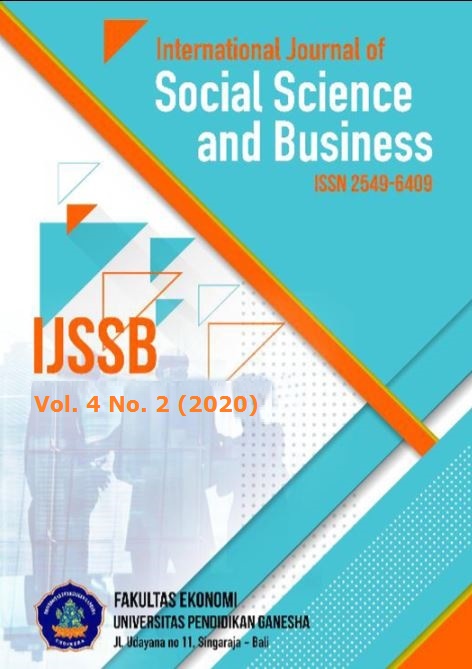Pengaruh Tingkat Inflasi, Tingkat Suku Bunga BI, dan Nilai Tukar Usd-Idr terhadap Perubahan Harga Saham Sektor Perusahaan Manufaktur di Indonesia
DOI:
https://doi.org/10.23887/ijssb.v4i2.22484Kata Kunci:
Stock price index manufacturing, BI rate, Exchange rate, Inflation.Abstrak
The objective of this study is to find out how macroeconomic factors such as exchange rate, BI rate and inflation rate can affect the manufacturing sector stock price index in IDX from 2011 until 2018. Generalized Autoregressive Conditional Heteroscedasticity (GARCH) is used as the analysis method in this research to find the fittest model. The result, only exchange rate that no significant effect to manufacturing sector stock, price index, Inflation and BI rate have significant effect to manufacturing sector stock price index.
Referensi
Agustina, & Sumartio, F. (2014). Analisa Faktor-Faktor Yang Mempengaruhi Pergerakan Harga Saham Pada Perusahaan Pertambangan. Wira Ekonomi Mikroskil.
Astuti, R., Susanta, H., & Apriatni. (2013). Analisis Pengaruh Tingkat Suku Bunga ( SBI ), Nilai Tukar ( Kurs ) Rupiah , Inflasi , Dan Indeks Bursa Internasional Terhadap Ihsg. Diponegoro Journal of Social and Politic of Science.
Ernayani, R., Robiyanto, R., & Sudjinan, S. (2017). Factors Influencing Profit Distribution Management of Sharia Commercial Banks in Indonesia. Journal of Economics, Business & Accountancy Ventura. https://doi.org/10.14414/jebav.v20i2.1055
Husnul, Habib Muhammad, R. R. H., & Sulasmiyati, S. (2017). Harga Saham Gabungan ( Studi Pada Indonesia Periode 2008 - 2016 ). 53(1), 66–74.
P., Bunga, S., Pertumbuhan, D. A. N., Terhadap, P. D. B., & Kewal, S. S. (2012). Pengaruh Inflasi, Suku Bunga, Kurs, Dan Pertumbuhan Pdb Terhadap Indeks Harga Saham Gabungan. Jurnal Economia, 8(1), 53–64. https://doi.org/10.21831/economia.v8i1.801
Kewal, S. S. (2012). Pengaruh Inflasi, Suku Bunga, KURS, Dan Pertumbuhan PDB Terhadap Indeks Harga Saham Gabungan.
krisna dan wirawati. (2013). Pengaruh Inflasi, Nilai Tukar Rupiah, Suku Bunga SBI Pada Indeks Harga Saham Gabungan di BEI. E-Jurnal Akuntansi, 3(2), 421–435.
Mardiyati, U. ; R. ayi. (2013). Analisis pengaruh nilai Tukar, tingkat suku bunga dan inflansi terhadap indeks harga saham. Jurnal Riset Manajemen Sains Indonesia, 4(1), 1–15.
Mirza, A., & Nasir, A. (2011). Pengaruh Nilai Kurs, Inflasi, Suku Bunga Deposito Dan Volume Perdagangan Saham Terhadap Return Saham Pada Perusahaan Perbankan Yang Terdaftar Di Bursa Efek Indonesia. Jurnal Ekonomi Universitas Riau, 19(04). Retrieved from https://je.ejournal.unri.ac.id/index.php/JE/article/view/826/819
Mishkin, F. S. (2010). Monetary Policy Strategy : Lessons from the Crisis. October. https://doi.org/10.1037/0022-0663.92.1.191
Mokhova, N., & Zinecker, M. (2014). Macroeconomic Factors and Corporate Capital Structure. Procedia - Social and Behavioral Sciences. https://doi.org/10.1016/j.sbspro.2013.12.897
Robiyanto. (2018a). The effect of gold price changes, usd/idr exchange rate changes and Bank Indonesia (BI) rate on Jakarta Composite Index (JCI)’s return and Jakarta Islamic Index (JII)’s return. Jurnal Manajemen Dan Kewirausahaan. https://doi.org/: https://doi.org/10.9744/jmk. 20. 1.45–52
Robiyanto, R. (2018b). Performance Evaluation of Stock Price Indexes in the Indonesia Stock Exchange. International Research Journal of Business Studies. https://doi.org/10.21632/irjbs.10.3.173-182
Robiyanto, R., Wahyudi, S., & Pangestuti, I. R. D. (2017). The volatility–variability hypotheses testing and hedging effectiveness of precious metals for the Indonesian and Malaysian capital markets. Gadjah Mada International Journal of Business. https://doi.org/10.22146/gamaijb.26260
Sartono, A. (2010). Ringkasan Teori Manajemen Keuangan, Soal, dan Penyelesaian.
Sonatan, J. (2015). . Data yang digunakan menggunakan data sekunder runtun waktu. 4(1), 1–13.
Triyono, D., & Robiyanto. (2017). The effect of foreign stock indexes and Indonesia’s macroeconomics variables toward Jakarta composite stock price index (JCI). Advanced Science Letters. https://doi.org/10.1166/asl.2017.9332
Wardani, D. K., & Andarini, D. F. T. (2016). Pengaruh Kondisi Fundamental, Inflasi, Dan Suku Bunga Sertifikat Bank Indonesia Terhadap Harga Saham (Study Kasus pada Perusahaan Real Estate dan Property yang terdaftar di Bursa Efek Indonesia tahun 2010-2013). Jurnal Akuntansi, 4(2), 77–90. https://doi.org/10.24964/ja.v4i2.233
Yogi permana. (2009). Pengaruh Kondisi Fundamental, Inflasi, Dan Suku Bunga Sertifikat Bank Indonesia Terhadap Harga Saham (Studi Kasus Perusahaan Semen Yang Terdaftar Di BEI). Jurnal Akuntansi.
Yunita, Y., & Robiyanto, R. (2018). the Influence of Inflation Rate, Bi Rate, and Exchange Rate Changes To the Financial Sector Stock Price Index Return in the Indonesian Stock Market. Jurnal Manajemen Dan Kewirausahaan, 20(2), 80–86. https://doi.org/10.9744/jmk.20.2.80-86
Investing.com. (2019). IDX Manufacture (JKMNFG). Diunduh pada 14 oktober, 2019, dari https://www.investing.com/indices/idx-manufacture
Bank Indonesia. (2019). BI Rate. Diakses pada 14 oktober , 2018, dari https://www.bi.go.id/id/moneter/tujuan-kebijakan/Contents/Default.aspx
Kompas.com. (2019). Industri Manufaktur. Diakses pada 21 oktober, 2019, dari https://money.kompas.com/read/2019/08/21/120600926/perkuat-daya-saing-industri-manufaktur-harus-lakukan-banyak-terobosan?page=all
Okezone.com. (2019). Investasi sektor manufaktur. Diakses pada 21 oktober, 2019, dari https://economy.okezone.com/read/2019/03/08/320/2027358/menperin-sebut-investasi-sektor-manufaktur-naik-signifikan











